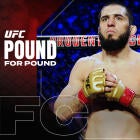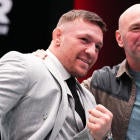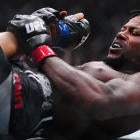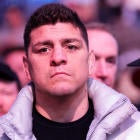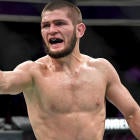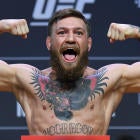Attempting to define UFC light heavyweight champion Jon Jones has never been an easy process.
A walking contradiction of greatness and trouble, the 32-year-old Jones is somehow both the sport's greatest fighter in history and its biggest cautionary tale at the same time. Even Jones' public persona is polarizing given how regularly his behavior floats between hero and villain.
So it should come as no shock, following a pair of disputed decisions inside the cage over his last two fights against Thiago Santos and Dominick Reyes, that Jones' most recent battle -- verbally sparring on social media over money with UFC president Dana White -- would leave quite a gray area when trying to determine who is right.
The most recent beef between star fighter and promoter began when Jones (26-1, 1 NC) shared interest on social media in moving up to heavyweight to face feared slugger Francis Ngannou. "Bones" then blasted the UFC over a series of ranting tweets following a failed negotiation that led to a lengthy "he said, he said" battle between Jones and White.
While there's plenty of reason to debate many of the "facts" shared by both sides, the core of the argument settles on Jones. The light heavyweight champ publicly revealed that he took home around $5 million per fight in recent years, while at the same time, the UFC president claims he was asking for "Deontay Wilder money" to take on such a dangerous challenge in Ngannou. White then countered that Jones isn't a big enough star to demand such a price, and Jones followed by threatening to vacate his 205-pound title and sit out the rest of 2020.
The debate between right and wrong only gets grayer from here thanks to Jones' behavior. During the same week he's entrenched in a highly-publicized financial squabble with his boss, the Albuquerque, New Mexico, resident was also captured on video physically disarming protesters of spray paint in a forceful attempt at maintaining peace.
The positive incident took place on the same Albuquerque streets in which Jones, who is already no stranger to felony arrest and failed drug tests, was pulled over in March and charged with DWI after firing a weapon in a public place. The UFC only complicated matters when White chose not to punish Jones nor strip him of his title. That decision not only enables Jones to keep fighting so the company can cash in, it contradicts White's recent comeback that Jones has "tarnished his own name" enough to devalue its worth.
Can't get enough UFC? Subscribe to my podcast -- State of Combat with Brian Campbell -- where I break down everything you need to know in the Octagon.
Jones could certainly be criticized by presenting the right message at precisely the wrong time given the current global coronavirus pandemic which prevents UFC from promoting fights in front of paying crowds and, according to White, will cost the company $100 million in 2020 due to the absence of live gates.
Yet the very spirit of what Jones is fighting for, even if the motive is more selfish than for the longterm gain of his fellow fighters, isn't wrong. And it makes Jones a potentially interesting martyr of sorts should other fighters follow suit and help build momentum.
Because of the manner in which White and the Fertitta brothers rescued UFC from certain death when Zuffa purchased the promotion in 2001, fighters have rarely held much leverage. The UFC has held firm control in everything from matchmaking to payouts. Outside of former two-division champion Randy Couture, the idea of big names being willing to risk all they have for better treatment has largely been a novel concept.
But Jones has always been different in ways that go beyond his greatness inside the Octagon or troubles outside of it. He famously went to war with the promotion in 2012 when he refused to face Chael Sonnen on short notice after Dan Henderson withdrew with an injury, which led to the unprecedented cancelling of UFC 151.
The two sides repaired their issues over the years, even to the level of the UFC moving Jones' return from a lengthy USADA suspension on six days' notice in December 2018 from Las Vegas to Los Angeles when the Nevada State Athletic Commission wouldn't clear him due to an irregular drug-test finding. Still, Jones remains such a wild card that recent developments are far from a surprise.
Long-criticized for underpaying fighters commensurate to what the promotion pulls in financially, UFC effectively created a landscape of haves and have nots when it comes to fight purses. Becoming a marketable star and championship contender often lifts fighters out of the latter, which means public complaints are almost non-existent due to how much of a struggle it was to reach that point.
The UFC also goes to the lengths of purposely underreporting payouts to state commissions, which prevents fighters from knowing what each other takes home and limits their bargaining leverage. Detailed financial reporting from multiple websites have exposed that the UFC paid only 16% of 2019 revenue -- a year which White bragged was the best in company history -- to the fighters, which compares negatively to the nearly 50% paid by pro sports leagues such as MLB and the NFL.
White, during an interview with ESPN's Dan Le Batard last week, angrily said that fighters are free to share their total earnings but choose not to. It's an assertion that was challenged on Twitter by Bloody Elbow's John S. Nash, who shared language in a fighter contract which expressively bans such a practice.
Should a company which sold to Endeavor in 2016 for a whopping $4.2 billion be able to afford paying one of its top fighters more than $5 million for a super fight? The answer, it seems, should be yes, especially considering the physical dangers of the sport and White's assertion that Endeavor's reported financial problems have "nothing at all" to do with the UFCs bold effort to return last month amid the COVID-19 outbreak.
Although Jones' reported claim of desiring "Deontay Wilder money" might not be a perfect comparison considering the heavyweight boxer had a number of suitors (including DAZN) driving up his market value in a disorganized sport with a far different structure than MMA, the top stars in the UFC are continually paid far less than top boxers. Some of that could be argued against by mentioning how much more expensive the UFC undercards are than most boxing pay-per-view cards where promoters largely mail things in, but it does nothing to justify the UFC's larger issue with underpaying top talent.
The only way things will ever change for UFC fighters is through some form of organizing, whether that comes in the form of a fighter union or a similar unified stance. While it would certainly take more than one big name in Jones, his current holdout could be a tipping point in more fighters stepping up to take control of their futures.
One such recent example of a marquee fighter seemingly knowing his worth comes from Henry Cejudo, who retired last month at the peak of his physical prime at age 33 with many pondering whether it was a sly power move to give himself more financial leverage upon a potential return. Cejudo, in theory, could've continued to defend his bantamweight title for the same money he was making against a long line of dangerous opponents, or he could wait for live gates to return and call his own shots better by only seeking super fights.
Jones believes he was the victim of public smearing from White and outright lying about the nature of the negotiations he had in trying to get paid more for facing Ngannou. Whether this was Jones beginning a smart exit strategy of big-money fights to retire on or White holding firm in belief that Jones is no longer the same fighter he once was, the UFC president's disingenuous response only reinforces the negative stereotype of poor fighter treatment.
How can Jones, in one breath, be called the greatest fighter of all time by his promoter and, in the next, dismissed as not being a big enough draw? How can White, even with the lack of a live gate, be so quick to shoot down Jones' dare-to-be-great hopes by attempting to make the kind of power move against Ngannou that the promotion regularly encourages?
Jones is no angel. We've established that. He's also not in the same atmosphere of being the type of draw that Conor McGregor, Brock Lesnar and Ronda Rousey once were. But for as inconsistent as he has been outside of the cage, both his drawing power and his success have been anything but inside of the Octagon.
That's why Jones' current soap opera with White and whether he can force his promoter's hand by asking to be let go could be the unlikely opening fighters have needed to get closer to earning what they feel they are really worth.














